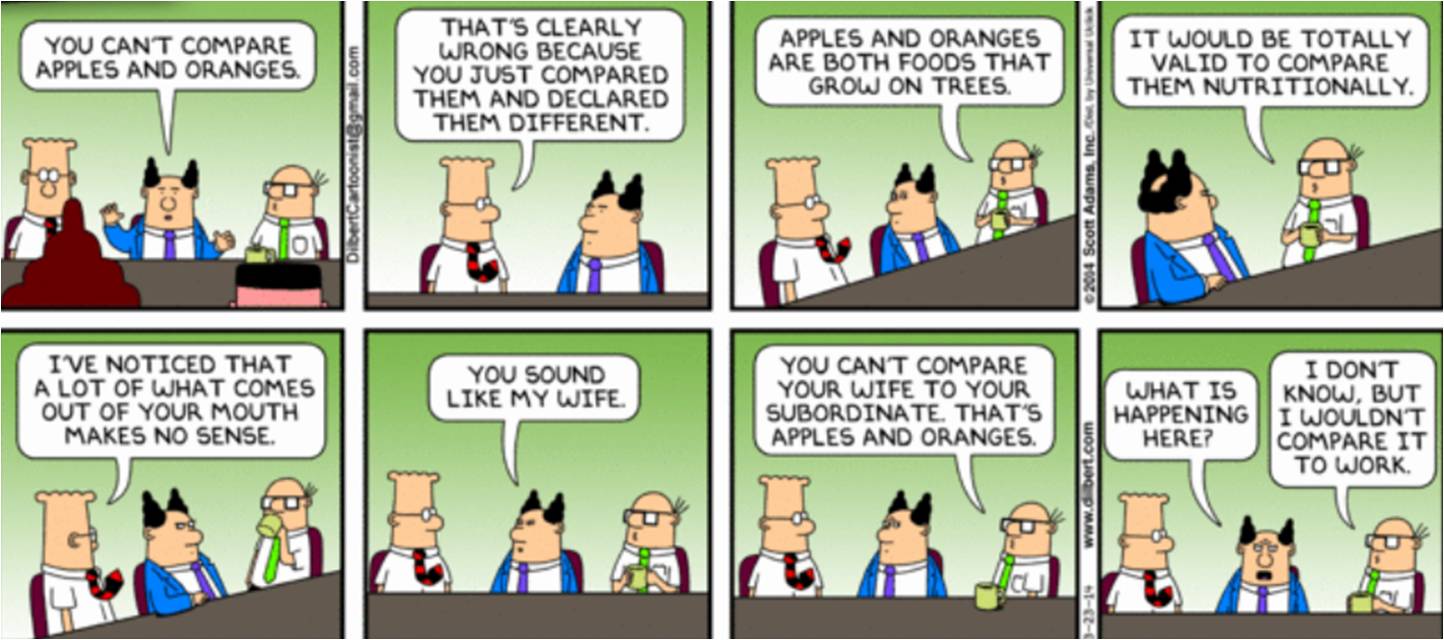As a former McKinsey consultant, I find Scott Adam’s take extremely amusing 🙂

As a former McKinsey consultant, I find Scott Adam’s take extremely amusing 🙂

Her story as well as that of her parents and her husband deserves to be told. The book is the story of the business, political and intellectual elite in the 20th century America. It is also a vividly personal story of a person who went from being a student, to a housewife, to one of the most important figures in American business and politics.
While shy, inexperienced and unsure of herself, she fought bought back with a vengeance when cornered to fight for the life of her company, the Washington Post. She single-handedly and successfully fought the office of the president during some of this nation’s darkest hours. She later saved the company during a devastating 9 month pressmen’s strike by working day and night with 125 others to produce a paper that typically required 1,500 to operate.
Her father was one of America’s most successful businessmen, chairman of the Fed and first president of the World Bank. Her husband got Johnson the presidency. She was also one of Warren Buffett’s closest friends.
Following Gary Smith’s amazing biography of Andre Agassi in Sports Illustrated I was inspired to buy Beyond the Game, a collection of the biographies he wrote. I was disappointed. Except for a few stories, I did not connect with the athletes he was writing about – probably because I had not heard of most of them and did not care for their sports.
Also, over the course of an entire book, I found Gary Smith’s style grating – his perpetual use of “I” made it feel as though he was inserting his story and writing his story rather than that of the athletes and their entourage. Interesting how something that can work so well for an article can fail over the course of a book.
A few months ago, I spent a few days in Dubai on business. I was impressed by the energy and modernity of the city. I actually liked the faux Moroccan style of the hotel I stayed in and the artificial nature of the constructions somehow felt aesthetically pleasing. I was shocked by the number of constructions. I counted over 70 40+ story buildings in construction and was told that there were around 200 40+ story buildings being built simultaneously. Imagine building New York from scratch in 3 years!
Despite the recent boom, anecdotal evidence seemed to point to a bubbly environment – I was told (but did not confirm) that inflation was around 18% while interest rates on mortgages were around 10%. With negative real rates no wonder people are borrowing to buy… That said even if the real estate market does crash the infrastructure that has been built will last for decades and set the basis for future growth in Dubai.
All in all, I was impressed by the progressive nature of the country and its people and will definitely be back to kite surf and race dune buggies in the desert!

A few months ago I blogged about the Psychology of Happiness (https://fabricegrinda.com/the-psychology-of-happiness/) which showed that empirical evidence suggested that most people have a mean level of happiness they rarely deviate from and that beyond a minimal level changes in financial circumstances had very little impact on happiness due to “hedonic adaptation.” The article went on to suggest several ways of systematically improving happiness.
Recent research of two Princeton professors, Alan Krueger (who was my labor economics professor at Princeton) and Daniel Kahneman further support this theory. Their paper, published in the June 30 issue of Science, shows that while people with above-average income say they are generally satisfied with their lives, the correlation is weakened when happiness is measured from moment to moment. The ways in which people with high incomes spend their time tend to make them more tense and stressed than their less-affluent counterparts.
Their study suggests that how one uses one’s time plays an important role in personal well-being. One of their studies asked 900 women to record a diary of how they used their time in a given day and how they felt during each activity. The activities when listed in order of happiness were intuitively rational: socializing, relaxing praying and eating were at the top of the list, while commuting, working and doing housework were at the bottom.
Small non-sequitur for the skeptics among you: historically economists were wary of subjective well being data because only the person reporting his or her response can verify accuracy. Moreover cultural factors may be at play – in the U.S. most people will answer yes to general questions like “are you happy?” However, asking specific time based question “does this activity make you happy” seemingly leads to accurate reporting as showed by positive correlation between the reports of happiness and physiological factors such as brain activity or the level of cortisol, a stress hormone. (Happy people tend to have more of the former and less of the latter).
The movie is dark, gritty, intense, fast paced and the dialogues are great! It adds a bit of James Bond flash in a subdued, not over the top, way to the grittiness of the Bourne movies to deliver a very effective experience. I still have a hard time seeing Daniel Craig as James Bond (I would have much preferred Clive Owen), but his rough around the edges look and acting is very effective for this story line – probably more so than someone who would have looked more classy, smooth and polished. Big thumbs up!
I really wanted to love Borat. I adored the previews and was impressed by the interviews and all the reviews I had read. The hype was so high; I walked into the movie expecting to see the funniest movie ever made.
Unfortunately, while Borat is entertaining and gets good laughs, it’s not the funniest movie ever made. The first half of the movie is much more entertaining than the second half. Shockingly for an 82 minute movie, the movie started to feel a bit long – not to mention that some of the parts felt staged (e.g.; the scene with Pamela Anderson). I suppose the Borat-kind of skit is more effective in 5 minute increments than in an entire 82 minute movie.
For Borat’s defense though the movie has a logical and coherent storyline – it’s not just skits stitched one after the other. Moreover Sacha Cohen is a genius at getting people to expose their prejudices on air – I just wished he had focused more on that and a bit less on trying to gross us out or making us cringe for its own sake. Go see the movie – it’s very different from most movies you will see and is entertaining – but don’t expect to see the funniest movie you have ever seen.
I have to admit that after seeing the previews I was skeptical both about the plot and the fact that Will Ferrell was cast in a dramatic role that did not require his usual over the top antics. The review on Roeper and Ebert last week convinced me to go see it.
It’s not as good as Roeper thinks it is, but it’s very clever and entertaining. The plot is creative. Shockingly enough Will Ferrell is effective in the dramatic role. Dustin Hoffman is great. Emma Thompson is so good I was inspired to watch Primary Colors again this week-end.
Einat Wilf, a young up and coming Israeli politician and intellectual, wrote an interesting article a few years ago on the sense of entitlement that easily becomes engrained in smart and talented people – a “disease” she called “The Red Carpet Syndrome.”
As she puts it: “Commencement ceremonies were about to begin, but the call hadn’t come in yet. Hours later I was back in my dorm room, diploma in hand, but had still received no message. What was keeping the Israeli Prime Minister’s Office? Didn’t they know I was finally graduating from Harvard? They must have forgotten. Otherwise, they would have called to say, “Hello, Ms. Wilf, we are thrilled that you are finally graduating from Harvard. There’s been a terrible vacuum here for the past four years. How soon can you be here?”
But the call never came. I suppose we all believe that if we do good work people at the top will notice, but it takes much more to really make it to the top – grit, tenacity, passion, willingness to put it all on the line – which are traits which are actually less likely to be found in the privileged ivy covered settings of our top universities. Few of the people who make it to the very top went to Ivy League schools. They were not given their positions. They worked for them and usually got there through the path less traveled.
In a way, I suppose Einat and I are exceptions. We went to Ivy League schools, were at the top of our classes, and worked at McKinsey before heading out to riskier endeavors in entrepreneurship and politics. However, for us, school never really ingrained a sense of entitlement. It was a place to let our intellectual curiosity run wild. To learn everything and anything surrounded by brilliant and fascinating people. At Princeton, I studied everything – molecular biology, the Roman Empire, Slavic literature, multivariable calculus, European politics, the Peloponnesian War, psychology, sociology and much more. It was brilliant and I learned to learn, but that was all it was.
As for McKinsey, it is an amazing place with the smartest people I have ever met where we solve interesting problems and meet Fortune 50 CEOs from an amazingly young age. However, we never saw it for more than it was: a place to learn oral and written presentation skills, teamwork and strategic and analytical thinking. It was essentially business school, except they pay you 🙂 It was a stepping stone on the way to realizing our ambitions and dreams.
For full disclosure, Einat is one of my best friends and my former officemate at McKinsey where we probably spent more hours remaking the world than working for the Firm 🙂
As I much as I liked that other magician period piece, The Illusionist, The Prestige is better. While the Illusionist is a neatly packaged movie with twist ending at the end, The Prestige displays much more creativity. There is palpable tension and intensity in the movie due to the conflict between Christian Bale and Hugh Jackman. Those two clearly deserve each other as you will see in the movie. The end was a bit disappointing, but all in all a great movie. Christopher Nolan is truly amazing in his ability to make extremely creative movies and yet have commercial success. I can’t wait to see his next movie!
It turns out our parents were right. Brushing our teeth, flossing and using Listerine daily does protect us from cavities. As I used to defer to authority, I duly complied and have never had a cavity to this date.
What would have been useful is to learn how to brush. I applied the tenacity of a Mr. Clean to my brushing endeavors using a hard tooth brush and essentially brushed my gums away. As a result, I had to have a gum graft this week which while less unpleasant that I was led to expect, I would not recommend to anyone.
Essentially they take cadaver tissue and graft it to your gums to protect the base of your teeth and prevent them from falling off.
Conclusion: